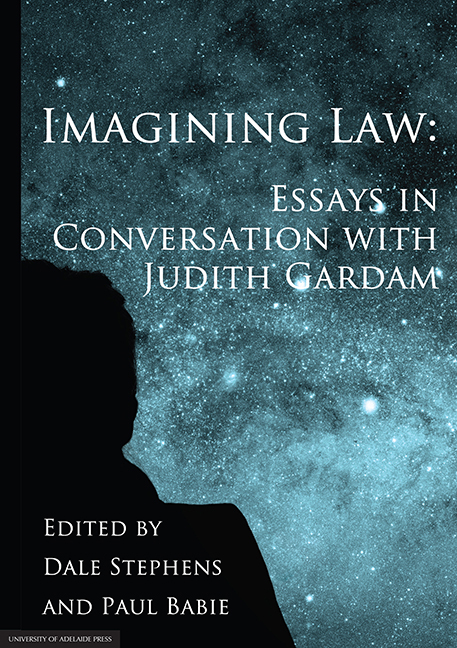Book contents
- Frontmatter
- Dedication
- Contents
- List of Contributors
- Acknowledgements
- 1 Introduction: Seeing Further over the Horizon – A World of Limitless Possibilities
- Part I
- Part II
- Part III
- Gender and Armed Conflict
- Gender and Feminist Concepts
- Theoretical Issues
- 12 Given the Freedom to Ask Anything, What Questions Ought the International Legal Scholar Explore? Using Gardam's ‘Alien’ to Examine this Question
- 13 The Alien Within
- A Selected Bibliography
- Table of Cases and Materials
- Selected Index
12 - Given the Freedom to Ask Anything, What Questions Ought the International Legal Scholar Explore? Using Gardam's ‘Alien’ to Examine this Question
from Theoretical Issues
Published online by Cambridge University Press: 05 August 2017
- Frontmatter
- Dedication
- Contents
- List of Contributors
- Acknowledgements
- 1 Introduction: Seeing Further over the Horizon – A World of Limitless Possibilities
- Part I
- Part II
- Part III
- Gender and Armed Conflict
- Gender and Feminist Concepts
- Theoretical Issues
- 12 Given the Freedom to Ask Anything, What Questions Ought the International Legal Scholar Explore? Using Gardam's ‘Alien’ to Examine this Question
- 13 The Alien Within
- A Selected Bibliography
- Table of Cases and Materials
- Selected Index
Summary
INTRODUCTION
Although Judith Gardam's work dealt with some of the most serious and poignant areas of international law, that of international humanitarian law and aspects of proportionality and gender, her writing was also creative and exploratory. An example of this creativity was her chapter in Sexing the Subject of Law, in which she used the device of an alien to investigate what international humanitarian law looks like from the outside. Gardam's chapter was entitled ‘An Alien's Encounter with the Law of Armed Conflict’. Her device of using a fantasy character of an alien to investigate what law looks like is adopted in this chapter. I have chosen this as the organising idea of my chapter in honour of Gardam for two reasons: first, in conversation, Gardam said that she enjoyed writing her chapter; and second, she created an intriguing idea that I strongly believe merits exploration and, indeed, reapplying in the twenty-first century. The idea that Gardam created is to understand the players in international law — the subjects of international law — by examining the ‘distinguishing features of these players’ and thereby elucidating their ‘distinguishing features’.
So, if you like, I am attempting to place myself in the role of an alien with nothing to do during an intergalactic storm but to browse through the law of armed conflict. This alien of mine desires to know something of the beings or the subject(s) described by these documents. What do they look like? What do they value? Are they all the same or are there various types? And, if so, what are their distinguishing features?
My chapter will use this device of the ‘alien’ as a form of personified objectivity, but rather than examining international humanitarian law, I will take Gardam's alien and consider the question: What is the role of the scholar of international law? The alien will travel through space, first viewing the world from afar, and then coming into law's orbit, landing and speaking to an individual. At each point, the alien will reflect on the various levels of analysis which scholars could employ in their scholarship. So, for example, the scholar could ask questions that consider the relationship of international law with the whole world, or its relationship with the state or particular individuals.
- Type
- Chapter
- Information
- Imagining LawEssays in Conversation with Judith Gardam, pp. 263 - 278Publisher: The University of Adelaide PressPrint publication year: 2016

